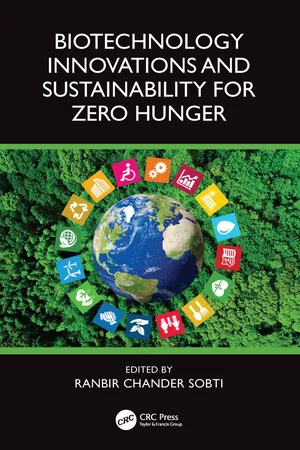
- 440 pages
- English
- ePUB (mobile friendly)
- Available on iOS & Android
Biotechnology Innovations and Sustainability for Zero Hunger
About this book
This reference book extensively examines the important role of biotechnology in tackling the global challenge of achieving zero hunger. The book delves into cutting-edge advancements and challenges in food biotechnology, crop improvement, genetic engineering, and the utilization of genetically modified organisms (GMOs) in sustainable agriculture. It provides a detailed examination of biotechnological interventions aimed at enhancing the nutritional content of crops, increasing agricultural productivity, and ensuring food security. Furthermore, the book explores the application of biotechnological techniques in improving animal-based foods, including advancements in animal breeding, genetics, and disease resistance. The chapters also address the integration of traditional breeding approaches with biotechnology for developing healthier and more productive crops. Additionally, the book introduces approaches for reduction of food waste through technological solutions, and the use of automation and robotics in food processing. This book is useful for researchers, academicians, and professionals of biotechnology, agriculture, food science, and sustainability.
Key Features:
- Covers cutting-edge biotechnological technologies for sustainable agriculture, providing solutions to address global hunger and achieve the goal of zero hunger
- Discusses various crop improvement techniques, including genetic engineering and genetically modified organisms
- Focuses on biotechnological interventions for enhancing crop productivity and nutritional value to improve food availability and quality
- Presents a detailed discussion of crop protection strategies and disease resistance mechanisms
- Provides a thorough examination of advanced technologies for improving animal-based foods and technology-based artificial meat
- Examines the application of biotechnological techniques in developing innovative food systems for reducing food waste
Frequently asked questions
- Essential is ideal for learners and professionals who enjoy exploring a wide range of subjects. Access the Essential Library with 800,000+ trusted titles and best-sellers across business, personal growth, and the humanities. Includes unlimited reading time and Standard Read Aloud voice.
- Complete: Perfect for advanced learners and researchers needing full, unrestricted access. Unlock 1.4M+ books across hundreds of subjects, including academic and specialized titles. The Complete Plan also includes advanced features like Premium Read Aloud and Research Assistant.
Please note we cannot support devices running on iOS 13 and Android 7 or earlier. Learn more about using the app.
Information
Table of contents
- Cover
- Half Title
- Title Page
- Copyright Page
- Table of Contents
- Preface
- About the Editor
- Chapter 1 Biotechnological Innovations for Sustainable Development toward Zero Hunger
- Chapter 2 Biotechnology Applications for Crop Improvement: Opportunities and Challenges
- Chapter 3 Biotechnological Interventions: Products and Supplements towards Zero Hunger
- Chapter 4 Crop Protection and Disease Management in Field Crops
- Chapter 5 Molecular Techniques for Host Plant Tolerance to Aphid Infestation in Wheat and Barley
- Chapter 6 Biofortification: Enhancing Nutrient Content in Staple Crops
- Chapter 7 Biotechnological Approaches for Improving Postharvest Shelf-Life of Fresh Produce
- Chapter 8 Plant–Microbe Interaction: Potential for Crop Improvement and Management
- Chapter 9 Crop Disease Management: Advancement and Challenges
- Chapter 10 Genome-Assisted Breeding for Crop Improvement
- Chapter 11 Sustainable Aquaculture: A Blueprint for Achieving Zero Hunger
- Chapter 12 Technology-Based Artificial Meats
- Chapter 13 Emerging Role of Plant-Based Scaffolding in Food Industry: An Overview
- Chapter 14 Food Safety and Biotechnology
- Chapter 15 Immunodiagnostics for Food Safety
- Chapter 16 Food Waste Monitoring and Analytical Technologies
- Chapter 17 Technology-Based Solutions for Food Recovery and Redistribution
- Chapter 18 Automation and Robotics in Food Processing
- Chapter 19 To Be or Not to Be: Dynamics of Epigenetic Regulation of Somatic Embryogenesis in Plants
- Chapter 20 Biological Control: A New Approach toward Insecticide and Pesticide-Free Food
- Chapter 21 Zero Hunger: Role of Speed Breeding and Gene Editing Techniques
- Chapter 22 Seed Priming: A Boon to Enhance Crop Resilience to Different Abiotic Stress
- Chapter 23 Nanopackaging for Improving Nutritional Quality of Food
- Chapter 24 Digital Transformation in Food Security for More Nutritious Food System
- Chapter 25 Role of Marker-Assisted Breeding in Crop Improvement
- Chapter 26 Genetic Diversity and Crop Improvement for Food Security
- Index